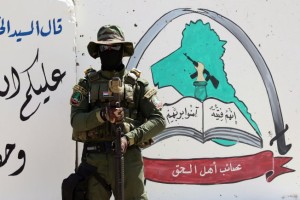By: Danielle Apfel
This weekend, ISIS militants seized control of the key Iraqi province of Ramadi after government forces were removed from a military base within the city. Ramadi, less than 100 miles from Iraq’s capital, Baghdad, and also located just a short distance from Iraq’s military headquarters, is now the current site of the ongoing struggle between the Islamic State militants and the preexisting socio-political constructs in the Middle East.
ISIS forces have shown a clear interest in this region. They not only blew up Iraq’s military headquarters this past March, but have also been slowly taking over parts of Ramadi since the beginning of last year. While their advances are not shocking, they still demonstrate the difficulties in combating this growing force.
The fight for the city, which broke out this past Friday, has resulted in the deaths of about 500 civilians and soldiers, and caused approximately 8,000 citizens to flee the city. The terror and destruction that occurred was possible despite the increased US involvement in the fight against ISIS. In order to prevent situations such as the one in Ramadi, the US had previously agreed to increase the amount of airstrikes against ISIS militants, evidently an unsuccessful attempt.
Although ISIS forces claim their victory over the city, the Iraqi Federal Police continue to fight to push the militants out. Such a goal is difficult to reach from the inside, as IS militants are said to be actively searching for government sympathizers, policemen, and pro-government tribesmen who remain in the city.
In a surprising move in order to combat the subversion in Ramadi, Iraqi Prime Minister Haidar al-Abadi has deployed the Hashd Al-Shaabi paramilitary forces to join with other Iraqi security forces and Sunni tribal volunteers. The Iraqi government approved the use of Shiite militias, some of whom answer to Iran, despite the predominately Sunni province in which they will fight.
The paramilitary forces have already proven to be beneficial in the fight against ISIS. In March, the Shiite militias aided the Iraqi army in bringing the city of Tikrit back under the control of the Iraqi government. The use of the Shiite forces in the mainly Sunni province will undoubtedly spur local tensions, as it remains to be seen whether the aid will be appreciated or viewed as a strategic move by the Shiites. Furthermore, complications and concerns are sure to come about between the Iranian ties to the paramilitary and the US airstrikes/coalition that Iraq depends upon, a fact that demonstrates how desperate the Iraqi government actually is to take back their city.
After the fall of Ramadi this weekend, Iraqi officials are urging their citizens to mobilize and fight against the militant forces. While aid is on its way, the city remains in the hands of Islamic extremists, and further represents the difficulties in effectively combating atypical military forces.

